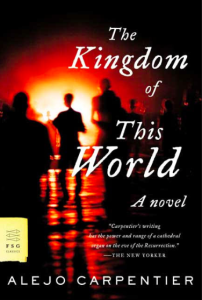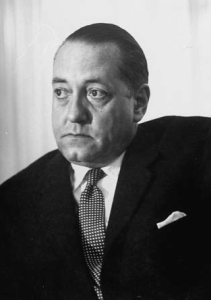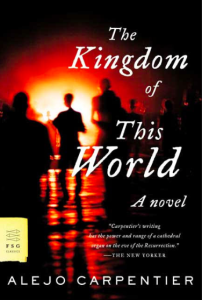Writers Read: The Kingdom of This World by Alejo Carpentier
 Alejo Carpentier’s The Kingdom of This World is a historical fiction novel set between the 1750s and 1810s, encompassing the time frame of the Haitian revolution. Carpentier creates an alternative history to the popular narrative of Toussaint L’Ouverture. The story is narrated by Ti Noël, an uneducated slave of the French plantation owner, M. Lenormand de Mézy. He bears witness to shifts in power from the French slave masters and colonial government; to Macandal’s execution; to the slave revolt that forces de Mézy to flee with Ti Noël to Cuba; to the dictatorial King Henri Christophe and his forced labor; to the whips of the mulattoes that take control of the North afterwards, bringing the dark-skinned Haitians back into servitude. Varying degrees of racial hatred—between the French and Haitians, between whites and blacks, and to some extent, between lighter-skinned mulattoes and darker Creoles—lead to extreme violence: rape, dismemberment, and beheadings. Ti Noël lives through these later incarnations of suffering much like he did as a French slave. The novel is infused with the mysticism, voodoo, and music of the slave cultures brought from various parts of Africa (and embodied by characters like Macandal and Boukman). Creolization is hinted at throughout, especially when Ti Noël and de Mézy flee to Cuba, the African slaves spreading their culture and music throughout the Caribbean and beyond.
Alejo Carpentier’s The Kingdom of This World is a historical fiction novel set between the 1750s and 1810s, encompassing the time frame of the Haitian revolution. Carpentier creates an alternative history to the popular narrative of Toussaint L’Ouverture. The story is narrated by Ti Noël, an uneducated slave of the French plantation owner, M. Lenormand de Mézy. He bears witness to shifts in power from the French slave masters and colonial government; to Macandal’s execution; to the slave revolt that forces de Mézy to flee with Ti Noël to Cuba; to the dictatorial King Henri Christophe and his forced labor; to the whips of the mulattoes that take control of the North afterwards, bringing the dark-skinned Haitians back into servitude. Varying degrees of racial hatred—between the French and Haitians, between whites and blacks, and to some extent, between lighter-skinned mulattoes and darker Creoles—lead to extreme violence: rape, dismemberment, and beheadings. Ti Noël lives through these later incarnations of suffering much like he did as a French slave. The novel is infused with the mysticism, voodoo, and music of the slave cultures brought from various parts of Africa (and embodied by characters like Macandal and Boukman). Creolization is hinted at throughout, especially when Ti Noël and de Mézy flee to Cuba, the African slaves spreading their culture and music throughout the Caribbean and beyond.
Voodoo, music, Macandal, Boukman, and animism: These systems of belief dynamically interface with the daily practices and culture of their believers. They exist.
The fable-like tale is rife with magical elements, which Carpentier refers to as lo real maravilloso, the marvelous real. The author is credited with the beginnings of Latin Magical Realism. Yet, Carpentier’s magical realism remains distinct from Gabriel Garcia Marquez’s in that Carpentier never strays from the realm of the possible, focusing on the particular extremes of Latin America and native belief systems. In The Kingdom of This World, these elements are both magical and real, in the way that these African-bound ideologies exist simultaneously as magical and real to the resisting slaves. Voodoo, music, Macandal, Boukman, and animism: These systems of belief dynamically interface with the daily practices and culture of their believers. They exist. Macandal, a pre-revolutionary figure, becomes a voodoo folk hero and is burned at the stake by the French. Boukman is a voodoo priest. After Henri Christophe becomes king in the Cap Haitien, he builds his palace and citadel into the cliff face with bull’s blood and the labor of recently-freed blacks. Like Macandal does earlier in the novel, Ti Noël shape shifts into various animals, finding out with each form that he does not fit in, much like the problems he faced in Haiti as a poor black man, always on the losing side. He returns to his human form, and in a moment of clarity, realizes that he has squandered his life. While Macandal changes into animal forms to serve men, here, Ti Noël changes shape in order to hide from the violence and injustice. The various wars serve later causes, unbeknownst to those suffering through them. Ti Noël states:

Photo: Alejo Carpentier, author of “The Kingdom of This World.”
In the Kingdom of Heaven there is no grandeur to be won, inasmuch as there all is an established hierarchy, the unknown is revealed, existence is infinite, there is no possibility of sacrifice, all is rest and joy. For this reason, bowed down by suffering and duties, beautiful in the midst of his misery, capable of loving in the face of afflictions and trials, man finds his greatness, his fullest measure, only in the Kingdom of This World. (179)
In the end, Ti Noël disappears into a hurricane, which destroys the last remnants of the French plantation of M. de Mézy.
As an alternate history of the Haitian revolution, Carpentier leaves out Toussaint L’Ouverture, mentioning him only in a single line about a carpenter who builds a nativity scene for the slave masters. Much of the Haitian revolution occurs while Ti Noël and his master are in Cuba. A Cuban author and musicologist, Carpentier pays homage to the ripple effects of the Haitian revolution, namely the spread of African culture to Cuba and its huge influence on Cuban music. Slave music, as embodied by the drums of war and feared by the French as well as Henri Christophe, is a form of resistance. Similarly, this authorial decision also highlights Cuba’s own revolution and its failed ideologies. Carpentier differentiates between revolution and reaction—the former can be a means of progress while the latter reveals a cyclical and cynical pattern in history.
Carpentier, Alejo. The Kingdom of This World. Trans. Harriet de Onís. New York: Farrar, Straus and Giroux, 1957.


 Diana Odasso is currently an MFA student at Antioch University Los Angeles and translation co-editor and blogger for Lunch Ticket. She has translated texts from French to English (published in Jim Harrison’s The Raw and the Cooked), ghostwritten for an autobiography, and written blogs for the Huffington Post. An interview with author Susan Straight was published in Lunch Ticket in the 2015 winter issue. She lives in South Florida with her two young boys and Boston Terrier.
Diana Odasso is currently an MFA student at Antioch University Los Angeles and translation co-editor and blogger for Lunch Ticket. She has translated texts from French to English (published in Jim Harrison’s The Raw and the Cooked), ghostwritten for an autobiography, and written blogs for the Huffington Post. An interview with author Susan Straight was published in Lunch Ticket in the 2015 winter issue. She lives in South Florida with her two young boys and Boston Terrier.


